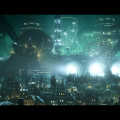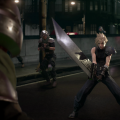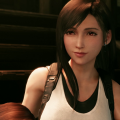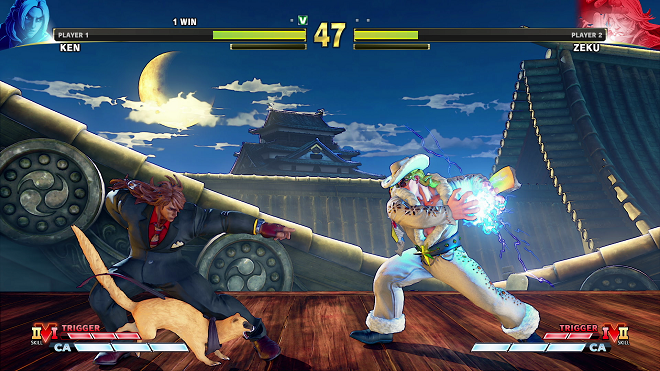Final Fantasy VII Remake — Lonely (Ex-)SOLDIER Boy

It’s become cliché to merely say that there was a lot to be concerned about with a specific game, given the number of titles that’s been applied to over the years — especially from Square Enix. But, uh, there was a lot — a LOT — to be concerned about with Final Fantasy VII Remake.
The very idea for the project invited skepticism for a laundry list of reasons. Tetsuya Nomura was directing it after being taken off a game that suffered through development hell (Final Fantasy Versus XIII/Final Fantasy XV), the final result of which felt unfinished upon release. This is also less a game and more a project, which is being split over several episodes that could take a decade to finish if we’re lucky. Square Enix doesn’t have a good track record with Final Fantasy VII projects made after the original game as part of the Compilation, which suffered from characterization issues (Advent Children — even though the Complete version fixed some of them) and overall quality issues (Dirge of Cerberus). That’s not even everything. How the hell could anyone not be nervous about how this could turn out?
So, color me surprised that not only did I enjoy FF7R (even after liking the demo), I also think it’s one of the best Final Fantasy experiences in years. Take note, though, that I’m not saying it’s flawless.
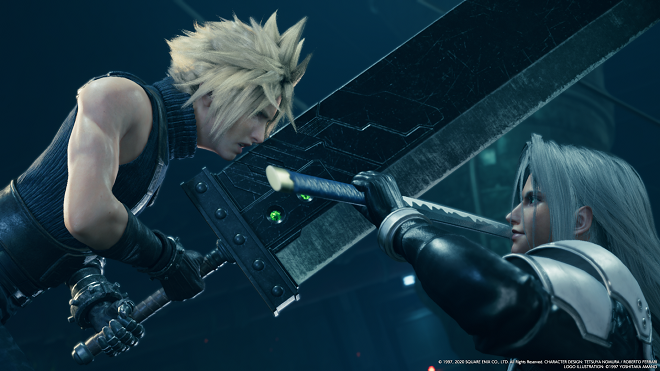
It would have taken too long and cost too many resources for Square Enix to remake the entire game at once with a good budget, thanks to how large the original title was. Thus, the development team tackled only the Midgar section in this game, taking a mere five-hour section of the original game and expanding it to a 25-40-hour experience. This mostly works, thanks to how much room for expansion the story surrounding megalomaniacal megacorporation Shinra and resistance group Avalanche was ripe for further elaboration. Several of the better story moments from the original are well enhanced with the superb production values.
In addition to hitting the story beats from the original, there’s time to highlight the highly propagandistic actions of Shinra only lightly touched upon previously. Characters like Avalanche members Jessie, Biggs, and Wedge receive more development, while Tifa and Barret get welcome characterization updates. The writers fortunately remembered that Cloud has a personality beyond being mopey, and that Aerith is much more than a pure-hearted maiden of light.
At the same time, the story also highlights the flaws with expanding a plotline intended to span a mere five hours. In the end, it feels like all buildup and little payoff, with the main characters not accomplishing much and the real tale awaiting in future games. The biggest blow dealt to Shinra isn’t even done by the main characters. Speaking of that: It shouldn’t be too surprising that Sephiroth is far more prominent than he was in this section during the original. He is popular enough, after all, that they concocted a hackneyed solution to revive him in Advent Children. (The movie is 15 years old at this point, so don’t you dare yell at me for unmarked spoilers.)
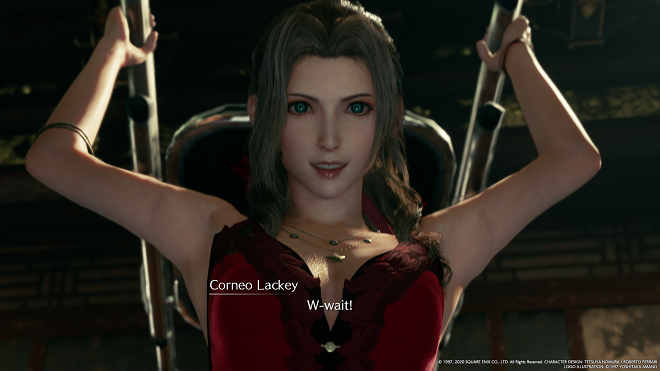
While FFVIIR’s story additions were criticized by some for being complicated to Kingdom Hearts levels, they’re not… yet. Key plot additions have the potential to get more complicated depending on how they’re developed from here. We’ll find out of the writers go off the chain in future installments.
Another aspect to be concerned about for this title? After CyberConnect2 was taken off the project, development was moved to a Square Enix’s internal studio, the same one responsible for the very divisive Final Fantasy XIII. FFVIIR, to no surprise, inherits some of that game’s DNA, but it doesn’t work entirely to its detriment.
Similar to the original FFVII Midgar section, this game is an extremely linear experience. Outside spending time in civilian segments of the Sectors (the game’s towns) and performing side quests, progression is reminiscent of FFXIII as the player travels on a figurative straight line through dungeons and from one story sequence to the next. Thankfully, the civilian Sectors give it enough variety to make the experience not feel repetitive. This game actually shows how something so ostensibly inconsequential like brief respites can go a long way towards making a journey feel more fulfilling, something the first FFXIII title was sorely lacking.
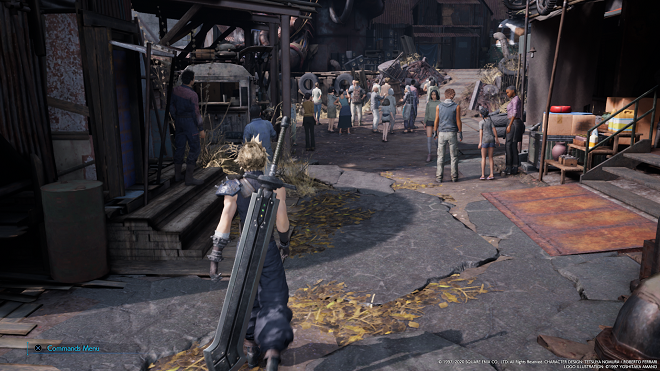
The dungeons in FFVIIR are also greatly expanded, and I won’t lie when I say that I enjoyed how much larger some of them were. Shinra’s headquarters actually feel like a real corporate entity, with a large beautiful-though-soulless building containing slew of regular working white collar employees, rather than it mainly being populated with the private military Shinra owns. On the other hand, key dungeons were expanded to repetitious levels. The underground subway section is just one that runs too damned long. And I would have tossed my controller across the room if I had to do another godforsaken crate puzzle. The dungeons are also very linear, exhibiting that big FFXIII energy I mentioned above. But make no mistake: The good outweighs the bad.
FFVIIR is the newest FF title to drop turn-based battles for real-time encounters, but it still includes elements from the old system. Normal attacks can be done at any time, but the Active Time Battle gauge is used to determine whether a character can perform an ability or a magic attack. It’s a fun system with player response and feedback that feels far better than the experiments in other recent FF games, including FFXIII and FFXV. It also represents the FFXIII DNA by inheriting Staggering, which remains rewarding when finding an enemy weak point and stunning them for several seconds. This was one of the better elements from the FFXIII titles, so don’t take this as a complaint.
There are battle system tweaks I’d like to see in future episodes, however. Keeping the camera more focused on the player would be good, along with adding more abilities to make air battles more fun. Free aim for characters with long-range weapons would make Barret and potentially Vincent more fun to play. There were several times where I wasn’t a fan of how the Blizzard and Aero spells have delayed explosions, making it easy to dodge them before the worst effects can land. But players can also benefit from this. On the whole, I never complained about having to fight.
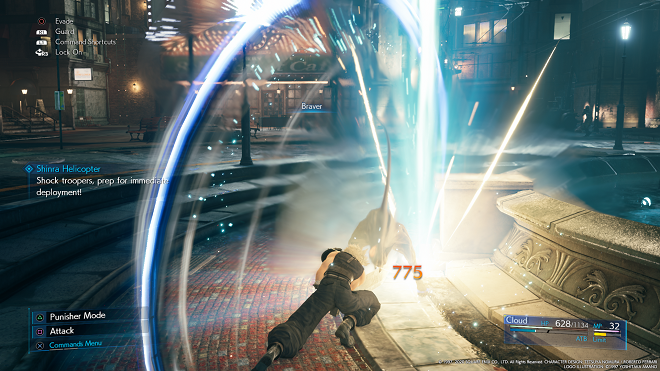
It couldn’t be a more arbitrary observation to say the graphics in an FF game are great, but yes, they are. Mostly. The character models are excellent and the modified designs are nice, despite some being very 90s. The environments look good too, though there isn’t much environmental variety with the game taking place in the urbanized Midgar. But the visual blemishes stand out when everything else is so easy on the eyes, like the extremely blurry flowers in Aerith’s garden and other occasional texture loading issues.
In terms of the presentation: The voice acting is the opposite of what trailers suggested in actually being good. Barret’s voice came off like a pathetic stereotype in previews, but it’s better, though not perfect, in the game. The other actors fit their main characters too, to the point that I preferred the new cast to the old one by the end. The only actor I’ll miss is George Newbern as Sephiroth, though Tyler Hoechlin isn’t bad per se. The music remixes also had me worried initially thanks to other FF titles like Crisis Core: Final Fantasy VII and the Dissidia series containing arranged tracks inferior to the original versions. But FFVIIR contains the best remixes yet, and the new tracks fit the game’s tone. And here people were worried about Masashi Hamauzu contributing when his involvement was announced.
It’s not fortunate that one of the best Final Fantasy titles released in a while is the first episode of a remade 1990s game, but this should provide other teams inspiration for how they can approach future titles. I’m not saying every element should be replicated; they can leave the extreme linearity here, for instance, and ditch the AAA game-style forced slow-walking sequences. The next Final Fantasy VII Remake installment should be more open with the characters leaving Midgar, but it’s too early to say whether they’ll have a full-on overworld or open world. Ideally, we won’t have to wait too long to see it, but you never know with Square Enix.

